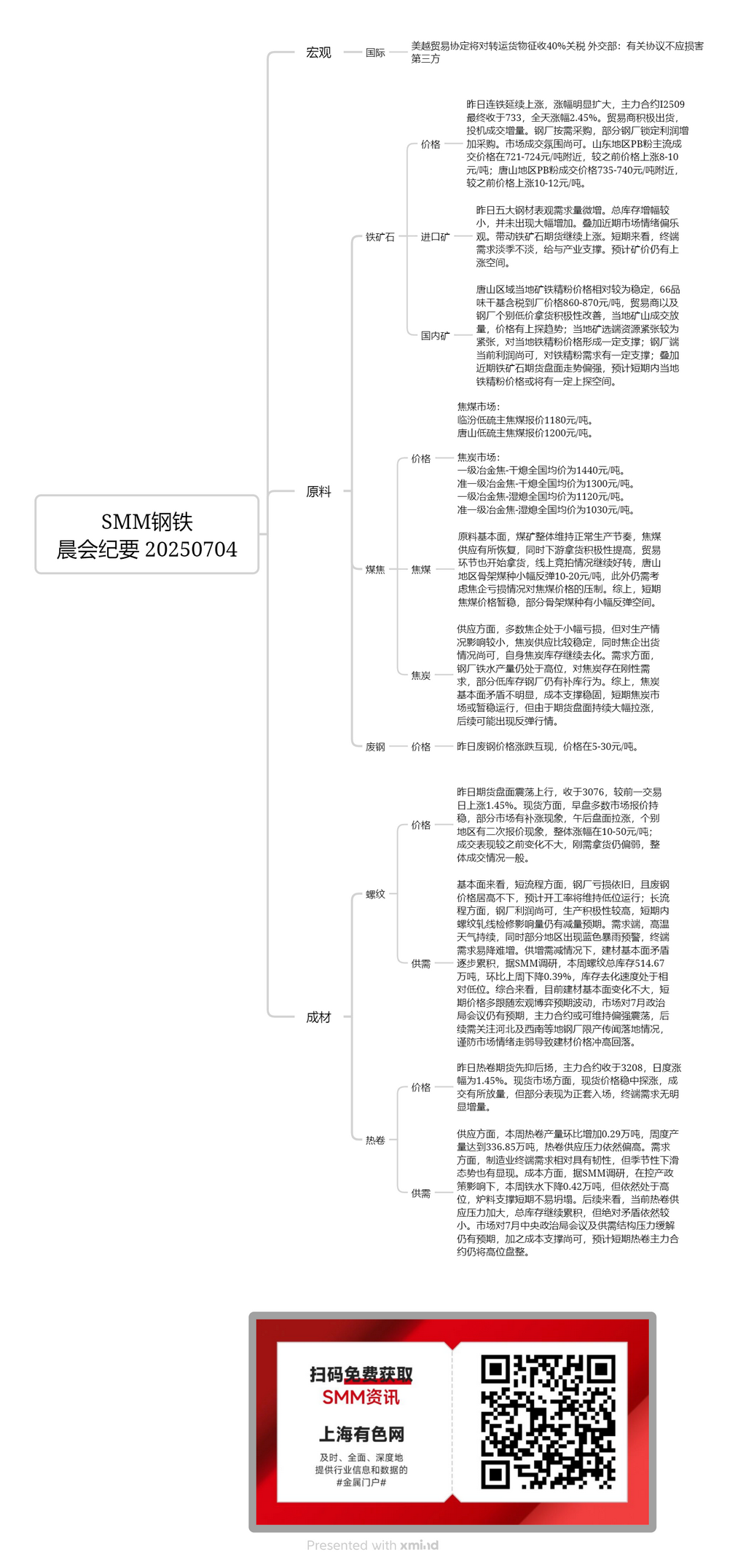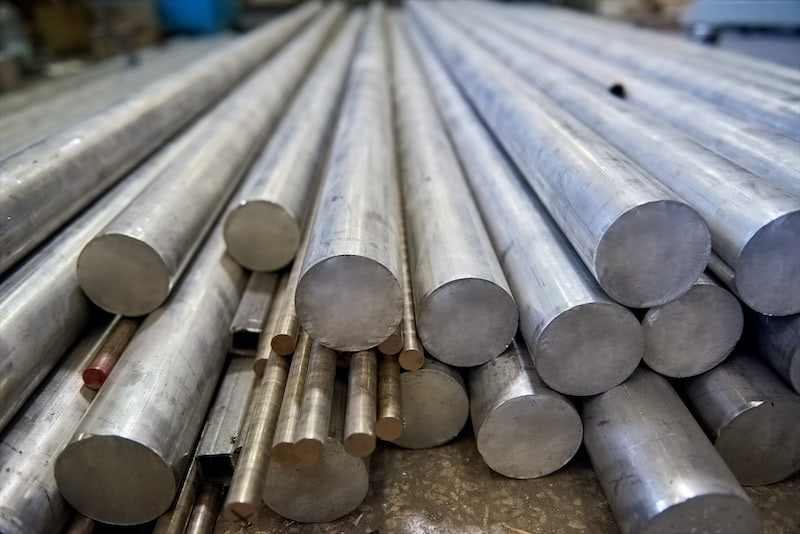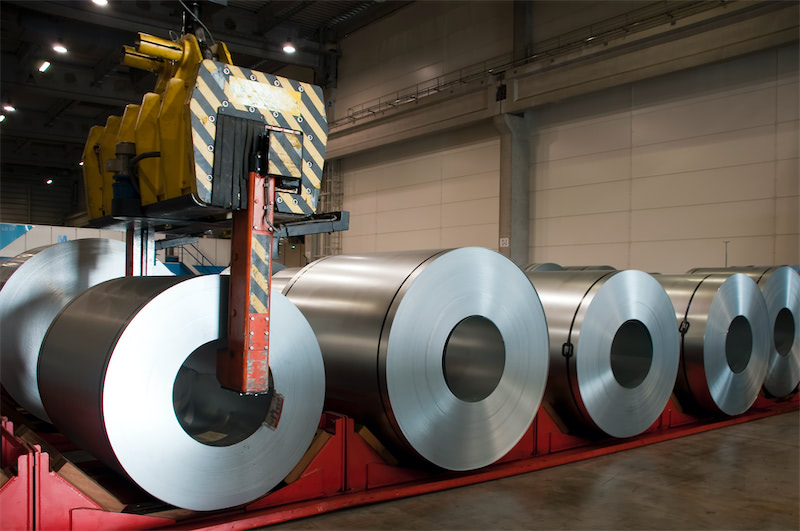
Domestic Ores:
In the Tangshan region, the prices of local mine iron ore concentrates are relatively stable. The dry-basis, tax-included delivery-to-factory prices for 66% grade iron ore concentrates range from 860 to 870 yuan/mt. Traders and steel mills have shown improved enthusiasm for purchasing at individual lower prices, leading to increased transaction volumes at local mines and an upward trend in prices. The resources at local mines and beneficiation plants are relatively tight, providing some support for local iron ore concentrate prices. Steel mills currently have moderate profits, which offers some support for the demand for iron ore concentrates. Additionally, the recent strong performance of iron ore futures has led to expectations of some upward potential in local iron ore concentrate prices in the short term.
Imported Ores:
Yesterday, DCE iron ore futures continued to rise, with a significant expansion in gains. The most-traded I2509 contract closed at 733, up 2.45% for the day. Traders actively sold their inventory, leading to an increase in speculative transactions. Steel mills purchased as needed, with some locking in profits and increasing purchases. The market sentiment was moderate. In the Shandong region, the mainstream transaction prices for PB fines were around 721-724 yuan/mt, an increase of 8-10 yuan/mt from previous prices. In the Tangshan region, the transaction prices for PB fines were around 735-740 yuan/mt, an increase of 10-12 yuan/mt from previous prices. Yesterday, the apparent demand for the five major steel products increased slightly. The total inventory growth was relatively small, without a significant increase. Coupled with the recent optimistic market sentiment, it drove iron ore futures to continue rising. In the short term, the end-use demand has been stronger-than-usual during the off-season, providing support for the industry. It is expected that ore prices still have room for increase.
Coking Coal:
The quoted price for low-sulphur coking coal in Linfen is 1,180 yuan/mt. The quoted price for low-sulphur coking coal in Tangshan is 1,200 yuan/mt. Regarding the fundamentals of raw materials, coal mines have generally maintained a normal production pace, and the supply of coking coal has recovered to some extent. Meanwhile, downstream buyers have shown increased enthusiasm for purchasing, and trading activities have also begun to pick up. Online auctions have continued to improve. In the Tangshan region, the prices of backbone coal varieties have rebounded slightly by 10-20 yuan/mt. Additionally, it is still necessary to consider the impact of coking plant losses on coking coal prices. In summary, coking coal prices are expected to remain stable in the short term, with some room for a slight rebound in certain backbone coal varieties.
Coke:
The nationwide average price for first-grade metallurgical coke (dry quenching) is 1,440 yuan/mt. The nationwide average price for quasi-first-grade metallurgical coke (dry quenching) is 1,300 yuan/mt. The nationwide average price for first-grade metallurgical coke (wet quenching) is 1,120 yuan/mt. The nationwide average price for quasi-first-grade metallurgical coke (wet quenching) is 1,030 yuan/mt. In terms of supply, most coking plants are experiencing minor losses, but this has had little impact on production. The supply of coke remains relatively stable, and coking plants' sales are moderate, with their coke inventories continuing to decline. In terms of demand, steel mills' pig iron production remains high, creating a rigid demand for coke. Some steel mills with low inventories are still restocking. In summary, the fundamentals of the coke market do not show significant contradictions, and cost support remains solid. The coke market may remain stable in the short term. However, due to the continuous and significant rise in futures prices, a rebound may occur subsequently.
Rebar:
Futures fluctuated upward yesterday, with the most-traded contract closing at 3,076 yuan/mt, up 1.45% from the previous trading day. Spot side, most market quotations held steady in the morning session, with some markets catching up on gains. In the afternoon, futures rallied, prompting secondary quotations in certain regions, with overall gains ranging 10-50 yuan/mt. Trading activity showed little change from before, as rigid demand purchases remained weak, resulting in moderate overall transactions. Fundamentally, for short-process steel mills, losses persisted amid stubbornly high steel scrap prices, keeping operating rates low. For long-process mills, profits were moderate, sustaining high production enthusiasm, though rebar rolling line maintenance is expected to further reduce output. Demand side, persistent high temperatures coupled with blue rainstorm alerts in some regions kept end-use demand prone to decline rather than recovery. With supply rising and demand falling, building materials' fundamental contradictions gradually accumulated. According to the SMM survey, rebar inventories totaled 5.1467 million mt this week, down 0.39% WoW, with destocking at relatively low levels. Overall, building materials fundamentals showed little change, with short-term prices largely tracking macro expectations. The market still anticipates the July Politburo meeting, potentially supporting the most-traded contract to hold up well. However, follow-up attention is needed on production restriction rumors in Hebei and Southwest China, guarding against a pullback in building materials prices if market sentiment weakens.
HRC:
HRC futures initially dipped then rose yesterday, with the most-traded contract closing at 3,208 yuan/mt, up 1.45% daily. Spot market, prices stabilized with tentative gains, and trading volume increased, though partly due to arbitrage entries, as end-use demand showed no significant improvement. Supply side, HRC production rose 2,900 mt WoW to 3.3685 million mt weekly, maintaining high supply pressure. Demand side, manufacturing end-use demand demonstrated resilience but exhibited seasonal softening. Cost side, per the SMM survey, pig iron output dropped 4,200 mt WoW under production control policies, though remaining elevated, providing short-term furnace charge support. Looking ahead, while HRC supply pressure builds and inventories accumulate, absolute contradictions remain relatively small. With market expectations for the July Politburo meeting and potential supply-demand easing, coupled with moderate cost support, the most-traded HRC contract is likely to consolidate at high levels.
![Before the holiday, the black chain is unlikely to see a trend-driven market [SMM Steel Industry Chain Weekly Report].](https://imgqn.smm.cn/usercenter/zUFfM20251217171748.jpg)

![[SMM Chromium Daily Review] Inquiries and Transactions Weakened, Chromium Market Showed Mediocre Performance Before the Holiday](https://imgqn.smm.cn/usercenter/ENDOs20251217171718.jpg)
